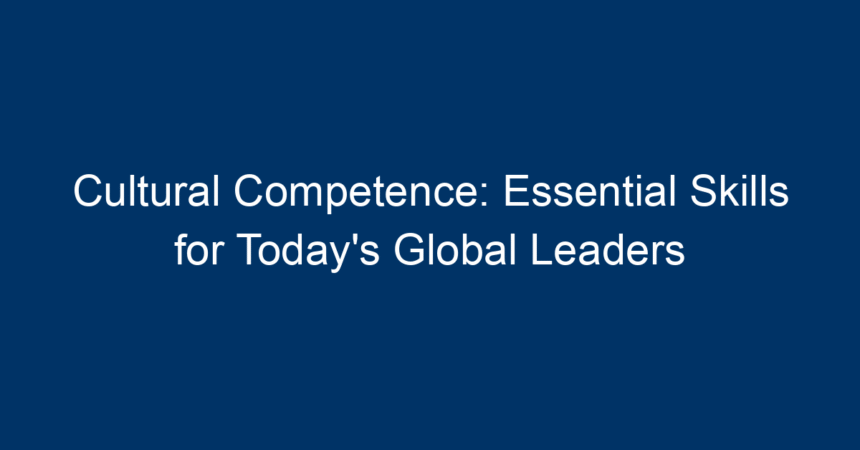In an increasingly interconnected world, the demand for leaders who possess cultural competence—the ability to understand, communicate, and work effectively across cultures—is at an all-time high. As businesses expand beyond borders and organizations engage with diverse teams, leaders equipped with cultural competence are better positioned to foster collaboration, drive innovation, and navigate complex global challenges. In this article, we explore what cultural competence entails, its importance to modern leadership, and the skills that cultivate this essential quality.
What is Cultural Competence?
Cultural competence is the ability to recognize, understand, and adapt to diverse cultural contexts and perspectives. This skill set goes beyond mere awareness of cultural differences; it involves actively engaging with those differences in ways that respect and appreciate various cultural backgrounds. Cultural competence encompasses three key components:
- Knowledge: Understanding the cultural norms, values, and practices of different groups.
- Skills: Developing the ability to communicate and interact effectively with individuals from various cultures.
- Attitudes: Fostering an open-minded approach and a willingness to embrace diversity.
By integrating these components, leaders can create inclusive environments where everyone feels valued and understood.
The Importance of Cultural Competence in Leadership
1. Enhanced Communication
Effective communication is a cornerstone of successful leadership. Leaders with strong cultural competence can navigate language barriers and varying social cues, which are often influenced by cultural backgrounds. By employing empathetic listening and adaptable communication styles, these leaders can build trust and rapport with team members and stakeholders, leading to more productive interactions.
2. Fostering Inclusivity
Cultural competence paves the way for diverse teams to thrive. Leaders who embrace diversity are more likely to create an environment where everyone feels safe to share their ideas, leading to enhanced creativity and problem-solving. By recognizing and valuing different perspectives, leaders foster a sense of belonging among all employees, which is crucial for team cohesion and morale.
3. Driving Innovation
Diverse teams are proven to be more innovative. When leaders prioritize cultural competence, they tap into an array of ideas and viewpoints that can lead to groundbreaking solutions. By encouraging collaboration between individuals from varied backgrounds, organizations can leverage the rich tapestry of experiences to drive creativity and innovation.
4. Global Business Success
In a globalized economy, cultural competence is not just beneficial—it’s essential. Leaders who understand the cultural intricacies of their international markets can make informed decisions that enhance business performance. This includes tailoring marketing strategies, negotiating deals, and managing operations in culturally sensitive ways, which can ultimately lead to increased customer satisfaction and loyalty.
Essential Skills for Developing Cultural Competence
1. Active Listening
Active listening is crucial in developing cultural competence. It involves not just hearing what others say, but fully engaging with their words and emotions. By practicing active listening, leaders can better understand the cultural nuances that influence their team members’ perspectives.
- Tip: Make a conscious effort to show that you’re listening through body language and verbal affirmations. Ask open-ended questions to encourage dialogue.
2. Empathy
Empathy allows leaders to put themselves in others’ shoes, helping them to understand the emotions and viewpoints of individuals from different cultures. This skill is vital in identifying and bridging cultural gaps within teams.
- Tip: Reflect on your own experiences and consider how you would feel in someone else’s position, particularly when cultural misunderstandings arise.
3. Cultural Awareness Training
Participating in cultural awareness training can significantly enhance a leader’s understanding of different cultures. These training programs often cover topics such as communication styles, social norms, and conflict resolution strategies across cultures.
- Tip: Look for workshops or online courses that offer comprehensive insights into global cultural dynamics relevant to your industry.
4. Flexibility and Adaptability
Leaders must be flexible in their approaches to accommodate differing cultural expectations. This may require altering communication styles, decision-making processes, or conflict resolution strategies based on the cultural context.
- Tip: Be open to feedback and willing to adjust your strategies when working with individuals from varied backgrounds.
5. Building Relationships
Cultivating genuine relationships with individuals from diverse backgrounds can significantly boost a leader’s cultural competence. Spending time learning about their cultures, traditions, and values can foster mutual respect and understanding.
- Tip: Engage with colleagues over coffee or lunch to discuss their cultural backgrounds and share your own experiences.
Navigating Challenges in Cultural Competence
1. Overcoming Stereotypes
One of the biggest challenges leaders face in becoming culturally competent is overcoming their own biases and stereotypes. It’s essential to recognize these preconceptions and actively work to dismantle them.
- Strategy: Educate yourself about different cultures and challenge your assumptions by seeking out diverse perspectives in your professional and personal life.
2. Managing Conflict
Cultural misunderstandings can lead to conflict. Leaders with cultural competence are better equipped to navigate these challenging situations with tact and sensitivity.
- Strategy: Address conflicts directly and respectfully, promoting an open dialogue that encourages all parties to express their viewpoints and work toward a resolution.
Actionable Insights for Leaders
-
Invest in Continuous Learning: Cultural competence is not a one-time achievement but a lifelong journey. Regularly engage in cultural training and seek feedback from peers and mentors.
-
Create an Inclusive Environment: Actively seek to include diverse voices in decision-making processes. Establish channels for open communication where everyone feels comfortable sharing their insights.
-
Lead by Example: Demonstrate cultural competence in your daily interactions. Model inclusive behavior and respect for diversity, setting a standard for your team.
-
Monitor Team Dynamics: Keep an eye on team interactions and address any signs of cultural friction promptly. Use these situations as learning opportunities for the entire team.
- Encourage Collaboration: Foster a culture of collaboration by encouraging team projects that bring together individuals from different backgrounds. This not only enhances cultural understanding but also drives innovation.
Conclusion
Cultural competence is an indispensable skill for today’s global leaders. As businesses continue to operate across borders and engage with diverse populations, leaders who prioritize cultural competence will be equipped to navigate challenges, foster inclusive environments, and drive innovation. By actively pursuing knowledge, enhancing communication skills, and demonstrating empathy, leaders can build strong, cohesive teams that thrive in a rich cultural landscape. As we advance into a future defined by globalization, let cultural competence guide your leadership journey and open doors to endless possibilities.




